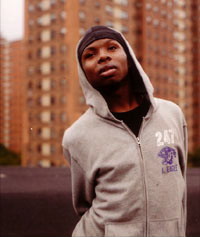Ali Forney
Ali Forney | |
|---|---|
 | |
| Born | Ali He'shun Forney April 12, 1975 Charlotte, North Carolina, United States |
| Died | December 5, 1997 (aged 22) |
| Known for | Transgender advocacy |
Ali He'shun Forney (April 12, 1975 – December 5, 1997) was an African-American gay and transgender youth who also used the name Luscious.[1]
Forney was a peer counselor of and advocate for homeless lesbian, gay, bisexual, and transgender (LGBT) youth and was killed on the street in the Harlem neighborhood of Manhattan in New York City. The Ali Forney Center for homeless LGBT youth was named after Forney when it opened in New York City in June 2002.
Life
Forney was born in Charlotte, North Carolina, and raised in Brooklyn, New York, by a single mother. Forney said that he first engaged in sex work at 13, and that the $40 made him feel rich. Rejected by his family, at 13 Forney was put in a group home, from which he soon ran away. Forney was in a series of foster placements, but found the streets preferable.[2] Forney continued to work as a sex worker, often dressed in women's clothing.[3] Forney admitted to using crack cocaine "because it eased the degradation and fear" from sex work.[4][5]
At 17, Forney joined the Safe Horizon Streetwork program, where counselors helped him acquire a Social Security card and a medical card. Forney completed a GED[4] and, at the time of his death, had started to work with the staff to help other homeless youth.[2] After turning 18, Forney received a settlement for a childhood car accident, but remained estranged from his family, and was ineligible for city youth shelters after reaching the age of 19.[4]
Proudly HIV-negative, Forney became good at peer counseling and promoted safety, carrying a pocketful of condoms and offering them to drug dealers.[4] Forney said, "I became a peer educator because I see so many HIV-infected people on the stroll. Even now, there are people who don't know how to use condoms."[2] In 1996, Forney was invited to San Francisco, California, to tell social workers about the needs of homeless transgender youth.[4]
At 4 a.m. on December 5, 1997, Forney was found by the police shot to death on the sidewalk in front of a housing project on East 131st Street in Harlem.[4] According to The New York Times Forney was the third young transgender sex worker murdered in Harlem in fourteen months.[3] The killing has never been solved.[6]
Over seventy people attended Forney's memorial service.[3][4]
Ali Forney Center
When Carl Siciliano started a center for homeless LGBT youth in New York in 2002, he named it the Ali Forney Center (also known as AFC) in Forney's memory.[7] The center opened in June 2002. It serves mostly Manhattan and Brooklyn youth aged 16 to 24 years, providing them with safe shelter and other help in addition to counseling for their families where needed.
See also
References
- ^ Ray, Nicholas; et al (2006). Lesbian, Gay, Bisexual and Transgender Youth: An Epidemic of Homelessness. National Gay and Lesbian Task Force Policy Institute, National Coalition for the Homeless (via The New York Times). p. 8, note 33: Forney self-identified as male when using his given name, female when using Luscious.
- ^ a b c Ray, p. 9.
- ^ a b c Rosenberg, Tina (July 12, 1998). "Helping Them Make It Through the Night". Editorial Observer in The New York Times. New York edition, section 4, p. 16.
- ^ a b c d e f g [dead link] Carter, Chelsea J. (September 5 1999). "In Memoriam: A Youth's Troubled Life, Tragic Death – Society: Thousands of New York's homeless teens live with violence and despair. Ali Forney was one of them"[permanent dead link]. Associated Press (via the Los Angeles Times). p. A1.
- ^ "A Life and Death on New York City Streets", Ali Forney Center.
- ^ Parascandola, Rocco (April 6, 2016). "NYPD takes fresh look at '90s transgender murders in Harlem". Daily News NY. Retrieved April 20, 2017.
- ^ "About Ali Forney". The Ali Forney Center. Archived from the original on November 3, 2009. Retrieved November 27, 2009.
- 1975 births
- 1997 deaths
- 20th-century American people
- American prostitutes
- Gay male prostitutes
- Homeless people
- LGBT African Americans
- LGBT and homelessness
- LGBT people from New York (state)
- LGBT people from North Carolina
- Murdered African-American people
- People from Brooklyn
- People from Charlotte, North Carolina
- People murdered in New York City
- Transgender and transsexual men
- Murdered sex workers in the United States
